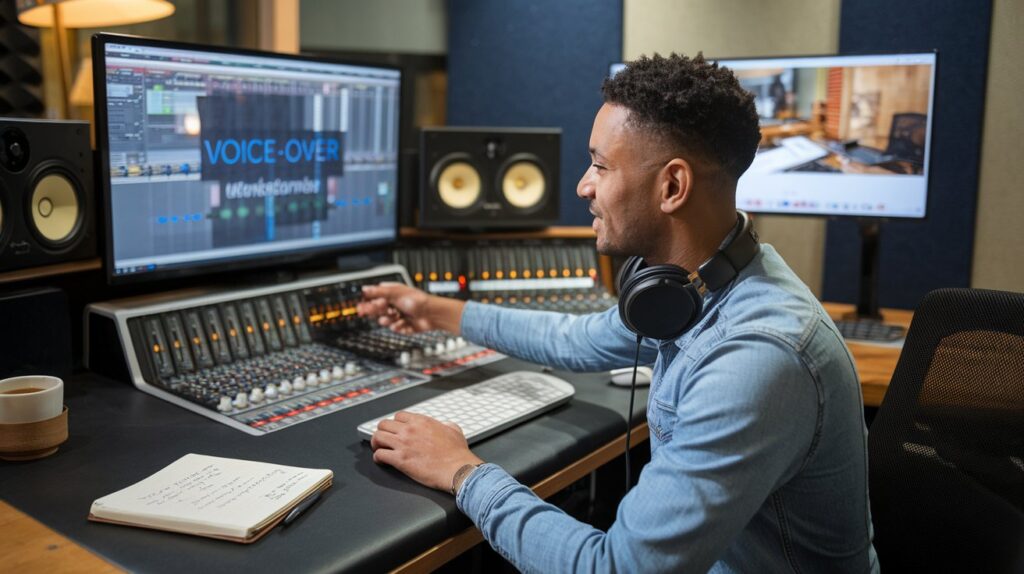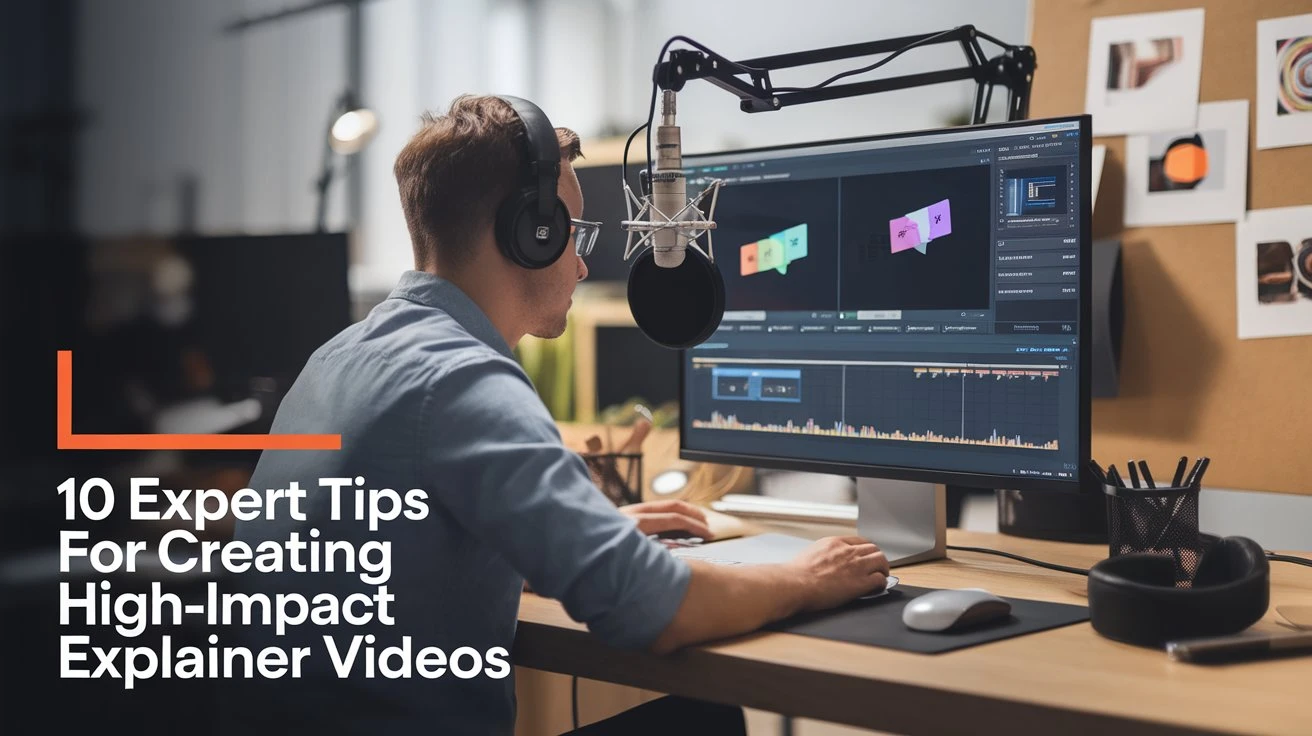The voice-over industry is booming, with businesses, filmmakers, and advertisers constantly looking for the perfect voice to bring their projects to life. If you’re wondering how to become a voice over artist UK, this guide will take you through each step of the journey—from training and equipment to finding gigs and building a thriving career.
Table of Contents
Step 1: Develop Your Voice Over Skills
Before stepping into the world of voice-over work, you must refine your vocal skills. How to become a voice over artist UK requires clear diction, proper intonation, and the ability to adapt your tone according to the project’s requirements.
Tips for Improving Your Voice:
- Practice daily by reading aloud and recording yourself.
- Work on articulation and pronunciation to ensure clarity.
- Experiment with different tones and emotions to diversify your range.
- Warm-up exercises like tongue twisters and breathing techniques to enhance vocal control.
- Take inspiration from professional voice actors by listening to audiobooks, commercials, and animated films.

Step 2: Invest in the Right Equipment
A high-quality recording setup is essential for professional voice-over work. Many clients expect crisp, clear audio without background noise, so investing in good equipment is a must. If you are serious about how to become a voice over artist UK, having the right gear is essential.
Essential Equipment for a Voice Over Artist UK:
- Microphone – A condenser microphone (e.g., Rode NT1-A or Neumann TLM 103) for clear sound quality.
- Audio Interface – Connects the microphone to your computer (e.g., Focusrite Scarlett 2i2).
- Headphones – Closed-back headphones like Audio-Technica ATH-M50X to monitor sound accurately.
- Pop Filter – Reduces plosive sounds (e.g., P, B sounds).
- Soundproof Booth or Acoustic Treatment – Helps eliminate background noise and echoes.
- Software – A Digital Audio Workstation (DAW) such as Adobe Audition or Audacity for recording and editing.

Step 3: Learn the Technical Side of Recording
Having the right equipment is one thing, but knowing how to use it properly is just as important. How to become a voice over artist UK isn’t just about voice skills—it’s also about mastering recording techniques.
Key Recording Tips:
- Use recording software like Audacity, Adobe Audition, or Reaper.
- Learn how to edit your audio to remove background noise and enhance clarity.
- Experiment with different microphone positions to find the best sound quality.
- Always record in a quiet space with minimal disturbances.
- Understand audio formats such as WAV and MP3, and when to use them.
- Master volume control and sound levels to ensure a professional recording.
Step 4: Get Professional Training
While some voice-over artists are naturally talented, professional coaching can take your skills to the next level. Many established voice-over artists have undergone training to refine their techniques and learn industry secrets.
Where to Find Voice Over Training:
- Online courses (Gravy for the Brain, Udemy, or Coursera).
- Voice acting workshops in the UK.
- Private coaching with experienced voice-over professionals.
- Practicing with scripts from different industries like commercials, audiobooks, or animations.
- Join voice-over communities to receive constructive feedback and guidance.

Step 5: Build a Strong Portfolio and Demo Reel
Your demo reel is your calling card in the voice-over industry. If you want to succeed in how to become a voice over artist UK, a professional portfolio is essential.
Tips for Creating a Great Demo Reel:
- Record multiple samples showcasing different tones and styles.
- Keep it short (60-90 seconds) and engaging.
- Make sure your best work is at the beginning of the reel.
- Use high-quality audio and avoid background noise.
- Customize your demo reels for different types of clients (e.g., corporate, gaming, audiobooks).
Step 6: Find Work and Market Yourself
Now that you’re ready to step into the industry, it’s time to find voice-over gigs. If you want to learn how to become a voice over artist UK, understanding the job market is key.
Where to Find Voice Over Work in the UK:
- Freelance websites (Fiverr, Upwork, PeoplePerHour).
- Voice-over marketplaces (Voices.com, Voquent, Bodalgo).
- Networking with video producers and agencies.
- Social media marketing (LinkedIn, Instagram, and YouTube).
- Attending industry events to meet potential clients.
Step 7: Set Your Rates and Negotiate Contracts
Determining your pricing is a crucial step in building a sustainable career. As a beginner, you might need to offer competitive rates, but make sure you’re not underselling yourself.
Factors Affecting Voice Over Rates:
- Experience level – The more skilled you are, the higher your rate.
- Project type – Commercials, audiobooks, and corporate videos have different pricing.
- Usage rights – Will the content be used on TV, radio, or YouTube?
- Length of the script – Longer projects require more time and effort.
- Revisions policy – Establish whether revisions will be free or charged separately.
Step 8: Create an Online Presence
A strong online presence helps attract clients and builds credibility. Learning how to become a voice over artist UK involves marketing yourself effectively.
Ways to Promote Yourself:
- Create a website showcasing your work and testimonials.
- Utilize social media to engage with potential clients.
- Start a YouTube channel with voice-over samples and tutorials.
- Optimize your LinkedIn profile to appear in industry searches.
Step 9: Register with Talent Agencies
Signing up with a talent agency can help you secure higher-paying gigs. If you’re serious about how to become a voice over artist UK, consider joining a reputable agency.
Finding the Right Talent Agency:
- Research agencies that specialize in voice-over work.
- Look for agencies with a strong industry reputation.
- Ensure the agency aligns with your career goals.
Step 10: Keep Improving and Stay Updated
The voice-over industry is constantly evolving, so continuous learning is essential. Stay updated on industry trends and keep refining your skills to remain competitive.
How to Stay Ahead:
- Attend voice-over conferences and workshops.
- Join voice-over communities and forums.
- Keep upgrading your equipment and software.
- Stay active on social media to attract more clients.

Conclusion
Becoming a voice-over artist in the UK takes dedication, skill development, and the right tools. From refining your vocal techniques and setting up a professional recording space to marketing yourself and continuously improving, each step plays a crucial role in building a successful career. By investing in high-quality equipment, seeking professional training, and networking with industry professionals, you can establish yourself as a sought-after voice-over artist.
Remember, the key to long-term success is consistency, adaptability, and continuous learning. Keep refining your craft, stay updated with industry trends, and take every opportunity to showcase your talent. Whether you’re starting as a freelancer or aiming to work with top agencies, your journey in voice-over artistry begins with the first step—so start today and make your voice heard!
By following these steps, you can confidently navigate how to become a voice over artist UK and build a successful career. Start practicing, invest in quality equipment, and put yourself out there to land exciting voice-over opportunities.
For more insights on the power of corporate video production, check out our detailed guide here: The Power of Corporate Video Production.
Want to see our previous work? Explore our portfolio here: Kah Productions’ YouTube Channel.






